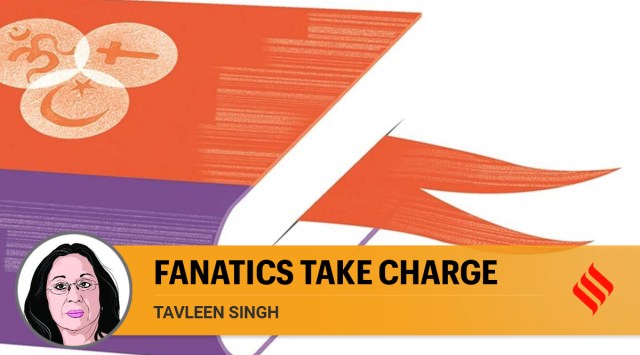
My intention this week was to write about the lynchings in Punjab gurdwaras in the name of ‘sacrilege’. They shamed me and I did not recognise my religion. It should shame our political leaders that they fulminated against sacrilege but were too cowardly to admit that the real desecration was that two men were lynched in places of worship. Then came videos of speeches calling for a genocide against Muslims by saffron-robed ‘saints’ at a Dharam Sansad (religious parliament) in Haridwar. And, to heighten tensions, political troublemakers released on social media a doctored video of Asaduddin Owaisi that made him sound as if he was threatening all Hindus in a post-Modi era when he was speaking specifically about police atrocities in Uttar Pradesh.
It soon became clear to me that what is happening is a much bigger thing than the horrible killings in those two gurdwaras in Punjab. What we could be seeing is fanatics seizing the religious narrative across the lines of faith. This is the culmination of a deliberate process of stirring religious passions and inter-communal hatred into politics that began after Narendra Modi became Prime Minister. From the moment he began his first term in 2014, he made it clear that he would wear his Hindu faith as a badge of honour, and unlike ‘secular’ prime ministers would never hesitate to participate in Hindu religious ceremonies in public places. He worshipped on the banks of the Ganga and allowed cameras to record every religious ritual that he performed inside the sanctum sanctorum of temples. It seemed at the time like a necessary correction to decades of disaffection brought about by too much smug and insincere secularism.
Then, when Modi remained silent in the face of Muslims and Dalits being lynched by his supporters, it became plain that the correction had gone too far, and that the consequences of his new anti-secular ideology would be terrible. If political leaders take secularism too far the consequences are usually benign. It means that religion should remain a private matter and that it should never again be given so high a political status that it could cause India to be divided in its name.
Partition was horrible for most Indians but, as the years went by, its wounds were allowed to slowly heal or at least be forgotten. But, this did not happen for the RSS whose idea of nationalism became inextricably mixed up with a hatred of Muslims. So, it was in a sense inevitable that when a man schooled in Sangh ideology became Prime Minister, he would ensure that those old wounds were reopened, and this is what Modi has done in different ways. When Muslims and Dalits were lynched by cow vigilantes directly affiliated to the BJP, Modi said nothing. When his handpicked chief minister in Uttar Pradesh set up ‘Romeo squads’ in police stations as almost his first act in office and BJP spokesmen defended this on the grounds that ‘love jihad’ had to be stopped, Modi remained silent again. When BJP chief ministers started passing laws to stop religious conversion, he chose to remain silent, so Christian priests and churches have come under attack in recent months. These attacks have become more frequent and more barbaric. Modi has remained silent.
The consequences of mixing communal hatred, religiosity, and hyper-nationalism into the normal business of political life are now clear to see. To borrow what my friend and fellow columnist, Vir Sanghvi, said in a tweet on the Haridwar event, ‘the lunatics have taken over the asylum’. Every religion has its share of extremists and bigots, but despite India’s long history of inter-communal violence, there has never been a time when they have been allowed to steer the ship of faith.
So, what happens next? Nothing good. We are likely to see more killings in the name of faith and more fanatics creeping stealthily out of the dark caves in which they have long remained hidden. They have sensed that this is their time, and that they have in some ways become more powerful than the most powerful political leaders. This is not good for India but inevitable when a Prime Minister as popular as Narendra Modi has paved the way for this to happen. At a more mundane level, will this help the BJP win Uttar Pradesh again? Who knows? What is clear is that the ‘opium of the masses’ is much easier to rely on at election time than promises of shining new highways and vague promises of ‘development’.